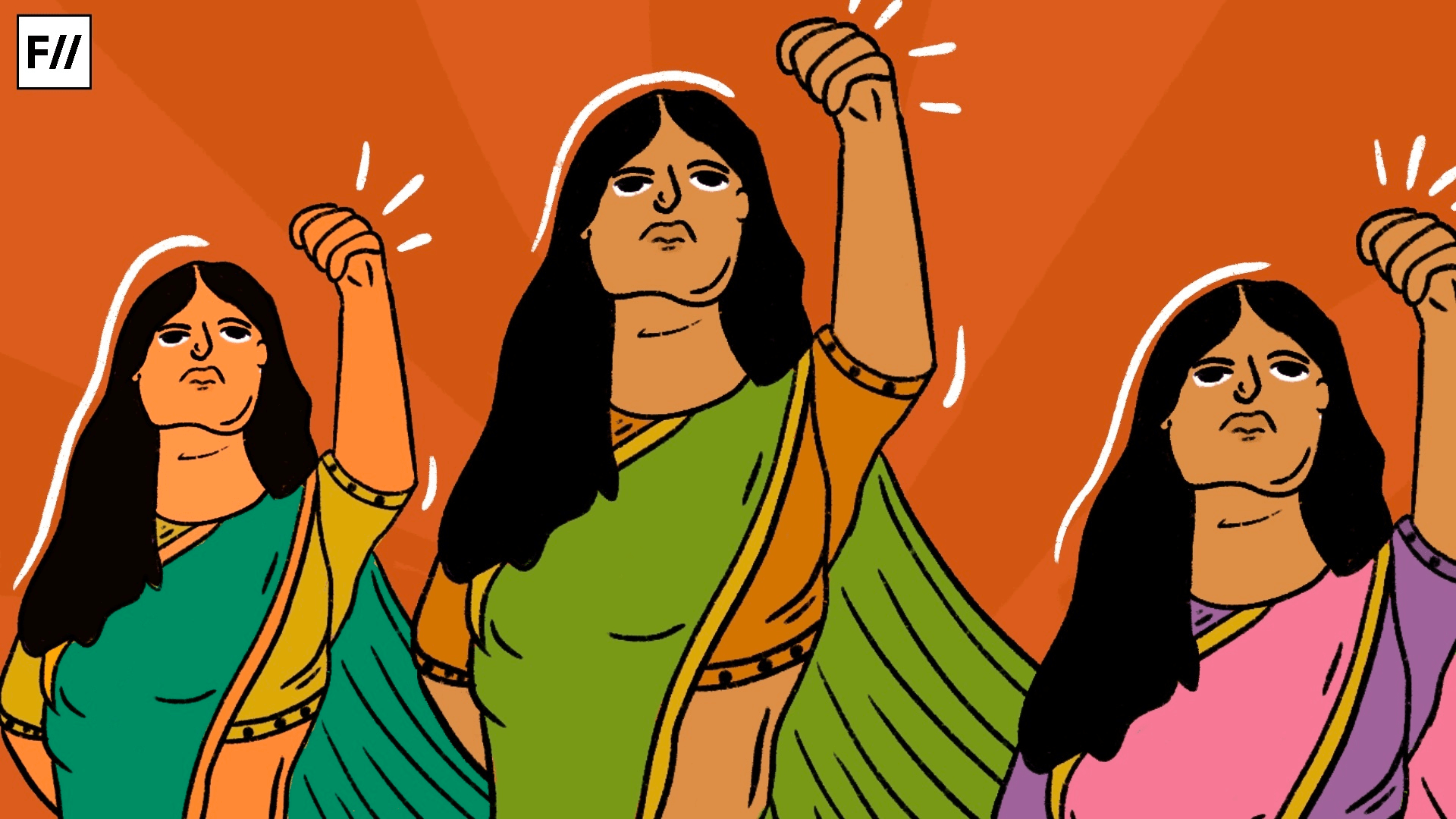One of the earliest memories of my adolescent years that makes me chuckle even today, include a precocious, fourteen year-old me half-reprimanding, half-teasing my Mills and Boons devouring classmates that, “There is no knight in shining armour who will come and rescue you damsels in distress, so you better just give up on the idea”. I made fun of their rose-tinted imaginations of what romance was supposed to be and being the class nerd and a habitual wet blanket, my classmates had written me off a long time ago.
But even as a teenager, the thought that there would/could be a man who would “rescue” me, and the thought that there was anything I needed rescuing from, made me more than slightly uncomfortable. Perhaps it was the dormant feminist in me that was resisting such typologies, or perhaps it was a pragmatic, and in some ways, a prescient response to what I thought life had to offer. Either way, twenty years down the line, it appears that my assessment that there are no knights in shining armour is not too off the mark!
The romantic imaginations of my classmates were shaped by old-fashioned ideas of chivalry. Today some of us have come to see chivalry as a somewhat problematic concept. What is chivalry and how has it entered the modern lexicon? It has an interesting history starring knights, horses and royalty in Medieval Europe. Chivalry originates from a Medieval Latin word cabbalerius which means horseman. This word found its way into old French to become chevalerie and subsequently into English chivalry. The Oxford English Dictionary defines it in the following ways:
- “The medieval knightly system with its religious, moral and social code”. Embedded within this code is courteous behaviour expected of a man towards a woman and other attributes such as “courage, honour, justice, and a readiness to help the weak”.
- The second older meaning refers to “Knights, noblemen, and horsemen collectively”.
the thought that there would/could be a man who would “rescue” me, and the thought that there was anything I needed rescuing from, made me more than slightly uncomfortable.
If we consider #1 and all the qualities attributed to chivalry in its original meaning, it exemplifies a gentlemanly masculinity that cares about those who need protection. Given the context of Medieval Europe and later, that would make perfect sense. In societies with great inequalities and exploitation, taking from the rich to give to the poor, a.k.a. the Robin Hood way, would have earned you the goodwill of the toiling masses, and would definitely have ensured you a place in the pages of history. Courteous behaviour towards women, given that women were assumed to be in need of protection also was well-aligned with this manifestation of chivalry. However, what the definition of chivalry does not make clear, is that perhaps such courtesies were only extended to women of a certain social class.
What about contemporary India? Two recent class discussions with two groups of students shed much needed light on what chivalry has come to mean for millennials in modern India. The first one was a discussion with 22-30 year-olds in an M.A. class, where two of the male students felt that an example that I had cited could be alternatively interpreted as “the husband caring about the protection of his wife”, rather than a form of controlling behaviour.
The example concerned a woman who I had come to know during the course of my research on domestic violence in Mumbai. She was being abused by her husband. He not only beat her in private, in public he kept a watchful eye over her every move. Ever so often I would catch him staring at us out of the corner of his eye, as she and I sat at the ledge of her kholi (house) to chat. I had assured him that I was researching on women’s health, so he didn’t view me suspiciously after the first few weeks of my fieldwork. But he didn’t stop the surveillance on his wife. While I was stunned to hear the interpretation of these two male students, I was also interested in unearthing how they had arrived at this conclusion.
They repeated that he was “only protecting her from a stranger”. Not one to give up easily, I kept pushing “What did she need protection from? What kind of threat could I possibly pose”? As the response inevitably led to some of the female students in the class slowly losing their patience; with these students, I had a major breakthrough. This is what they said: “You are a stranger. You are outside the family. You could put her in danger”. It appeared that they had drawn a mental equivalence between a wife and a child, without meaning to do so.
Also Read: Wonder Woman And The Refreshing Absence Of The Male Gaze
I pointed this out and then offered another situation: would it be acceptable, indeed expected for the wife to similarly keep an eye on her husband? What if there was a male researcher and he was talking to the husband for extended periods of time? They laughed – the question seemed preposterous, though they admitted that she would be right to start keeping an eye, if the researcher was female, bringing an angle of possible sexual jealousy, which hadn’t existed earlier.
However they stuck to their point that she needed protection because she was a woman. This is of course borne out of socialisation and a certain notion of respectable masculinity that has the danger of transforming into toxic and controlling behaviour if not held in check. Also drawing an equivalence between children who are often believed to not have agency, and adult women has dangerous precedents and repercussions. One only needs to analyse some of the debates around Love Jihad or love marriages to grasp why this is a deeply problematic and flawed argument. Rescinding agency from women under the guise of her protection, is a textbook example of patriarchal control.
The second time around I asked a more direct question to the 19 First-Year undergraduate students I teach. The women responded that “Yes, it is nice to be treated with chivalry, but up to a certain point”. The boys responded that they pull up a chair for a lady or hold the door for her because “I want to be nice. It’s a matter of being nice, not because you (women) can’t do it”. The women responded with “How about be nice to everyone?”. The boys said “You need to have those etiquettes. Chivalry is a way to make people feel comfortable. Oh and also please make sure women are also chivalrous towards guys”!
So I asked, would they also pull up a chair for a male friend? The answer was a resounding no from the boys and they gave me a clear breakdown of how male adolescent sociality works: “See only 20% of the times we are serious, 30% of the time we are joking and 50% of the time we are trying to prove who is the real man. If I did it for a male friend, he would think that I think he is gay or a sissy! He would feel insulted.”
what the definition of chivalry does not make clear, is that perhaps such courtesies were only extended to women of a certain social class.
The women thought that while they don’t wish to be viewed as being incompetent, there are situations that if men offered help, they would gladly accept. For example, when lifting heavy objects or if they felt unsafe walking around at night and a male friend offered to walk with them. Especially for the latter, in the context of sexual harassment, there was a heated debate on what were the conditions that had made it necessary for women to have to seek male presence to ensure safety? That rather than being a desirable state of affairs, this was indeed a response to a state of insecurity that women are experiencing on the streets on a daily basis.
While by no means representative in terms of the Indian population, these discussions do give us insights into how the young and urbane population may have come to understand chivalry. It is both interesting and tragic to note that young men view acts of kindness towards other young men as insulting their physical abilities, rather than civility. So clearly in their minds, being chivalrous is tainted with certain gendered notions of politeness.
We have entered a time when women are breaking all manners of ceilings and entering professions including the armed forces, which used to be considered the sole prerogative of men. There are women conductors, taxi-drivers, auto-rickshaw drivers and security guards. If chivalry is narrowly understood as acts involving courage and compassion, which are gender-neutral and carry no inherent sense of superiority, either moral, emotional or physical, then, and only then, it is not sexist.
However even today, the sight of a uniformed army officer who would be everything that a gentleman is expected to be, still pulls at the heartstrings of many a young woman. It is to be noted that these women have not lived their lives in militarised parts of India, where army fatigues and combat boots conjure a different, malevolent image altogether. But if the same “gentleman” dissuaded her from having her own career, friends, choices and life, that would not be considered an act of protection. In an era where dating apps such as Bumble are becoming a game-changer by encouraging women to make the first-move, old-fashioned chivalry may be all, but dead. And that, may not be a bad thing after all.
Also Read: It’s Time For The Argumentative Bride
Featured Image Credit: Ignitum Today





This is yet another example of upper class feminist issues. I agree that perhaps it is subtle sexism, un intended, and extremely grey and confusing for men. I do think that a lot of men have moved towards letting women do their own thing- pull your own chair, pay your half of the bill, etc and that’s cool.
this is a really really minor issue for feminism, and so typically upper class, and urban. please do not become a typical third wave feministic site that deosn’t give a shit about women in the lower class because no body gives a shit about those feminists.